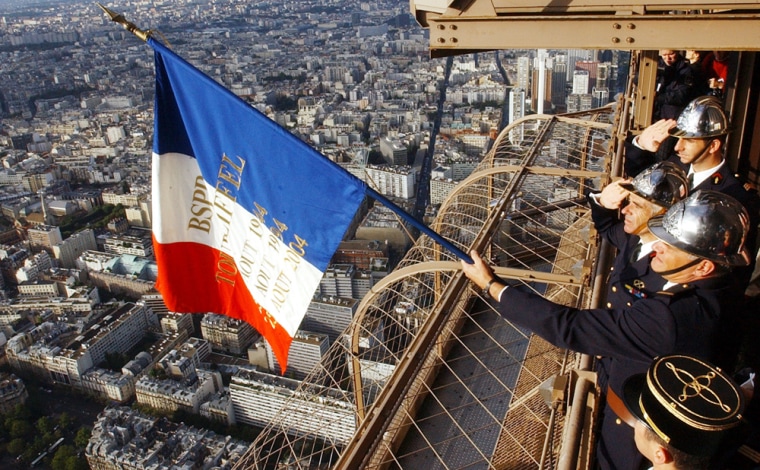The Champs-Elysees, free at last, was awash with wild joy on Aug. 25, 1944. But deep in the heart of France the war raged on, with Frenchmen killing Frenchmen to aid a desperate Germany.
And now, 60 years later, the people who suffered most are among the staunchest supporters of a new Europe in which France and Germany are, essentially, just two members of a 25-nation super-state.
“This is the great triumph of the 21st century,” said Jean-Marie Delabre, 81. “Peace is accepting the idea that you must live with others and forge natural differences into something stronger.”
He added: “I don’t think I’d have said that a few years after the war.” While Paris celebrated, his Resistance unit fought on near Dijon. Captured, he was in German prison camps until armistice in May 1945.
With time, Delabre decided that since wars are much easier to start than to finish, the only answer is to avoid them.
“A united Europe is a lesson for the rest of the world,” he concluded.
Deep divisions among French
War that left millions dead had not only pitted France against its ancient neighbor and foe, it also forced deep divisions among the French themselves. Some resisted, but many collaborated.
Jacques Delarue, now 85, heard only faint echoes of the joy in Paris from his Vichy France prison cell in Limoges.
“We all thought the war would be over after Paris, but we were wrong,” he said. “That just increased the bitterness and deepened divisions between collaborators and real Frenchmen.”
As allies pushed toward Paris, he said, he watched the French milice, militiamen loyal to Germany, sweep into the prison yard to deal with three captured French Resistance fighters.
“I could hear it all from my cell,” he said. “The three were tried, sentenced, lined up against a wall and shot. The whole thing was over in less than an hour. Such things went on all the time.”
But today, like nearly every one of dozens of veterans interviewed by The Associated Press, he lauded efforts to meld ancient foes into a modern union. “We have to stop old stupid rivalries,” he said.
Bittersweet mix of emotions
People who remember Aug. 25, 1944, are celebrating it with a bittersweet mix of emotions. For many, the horror and humiliation of occupation did not sink in until years, if not decades, later.
“When it ended, we had all more important things to worry about, like finding our family members and repairing our lives,” Delarue said. “Only later did we have the luxury of analyzing things.”
Almost immediately, the French army was off extinguishing colonial brush fires in Asia and Africa, including a war that spread in Vietnam and ended only in 1954.
Although liberators found Germans had mined the bridges over the Seine, it was 20 years before most people realized the danger Paris had faced.
Larry Collins, co-author of “Is Paris Burning?”, told the AP his idea for the book came only in 1962 after he saw an item in a London newspaper about Hitler’s obsession with obliterating the City of Light.
“Before then, hardly anyone knew of the threat Paris had faced and how narrowly it escaped,” he said. “When we started researching, we found an elaborate plot.”
By then, feelings had mellowed.
“I’ve never sensed any hostility at all, even when I first came here as a 14-year-old girl in the 1960s,” said Sabine Martin, a German businesswoman who lives happily in Paris.
John Morris, 87, reached Paris five days after Liberation and is still here. He was Life magazine photo editor, and his archives contain the Sept. 11, 1944, edition with the headline: “Paris Is Free Again.”
'Scars of time'
Charles Wertenbaker wrote, “Paris still looks like Paris — a little dirty and scarred with no irreparable damage. Notre Dame is chipped from machine-gun bullets ... and these scars will merge with the scars of time.”
Still, he noted, the people were desperate: “Pretty women dive for cigarette butts on the street and a half-eaten tin of Army rations will be grabbed up out of the gutter.”
Life writer William Walton described how he liberated the girls of the Moulin Rouge. Crossing Paris under a hail of flowers, he wrote, “I estimate I kissed a thousand females, from 2 to 90 ... For one night, every American was a Lindbergh.”
But joy was tempered with death. Even now, no one knows how many hundreds of servicemen and civilians died in the fight for Paris. From one end of the city to the other, plaques recall the victims: men, women and teenagers.
By the Place de la Concorde, fresh flowers grow under a row of 10 marbled plaques in an old stone wall. The first remembers Marcel Bizien, a tank commander in the French 2nd Armored Division.
Bizien’s tank fought a high-noon duel with a German Tiger on the Champs-Elysees on Aug. 25. The French gunners destroyed the Nazi tank with a direct hit, but they were killed in the aftermath.
Jacques Fouet, 81, was a fireman who in the final days put on an army uniform to hunt down Germans. He watched that tank battle with a mix of pride for a revived France and hatred for Nazis who caused such pain.
Nowadays, Fouet says he is thrilled to see tight new links between old adversaries. “I have always said that on the day Germany and France come to an understanding, there will be no more war in Europe.”
